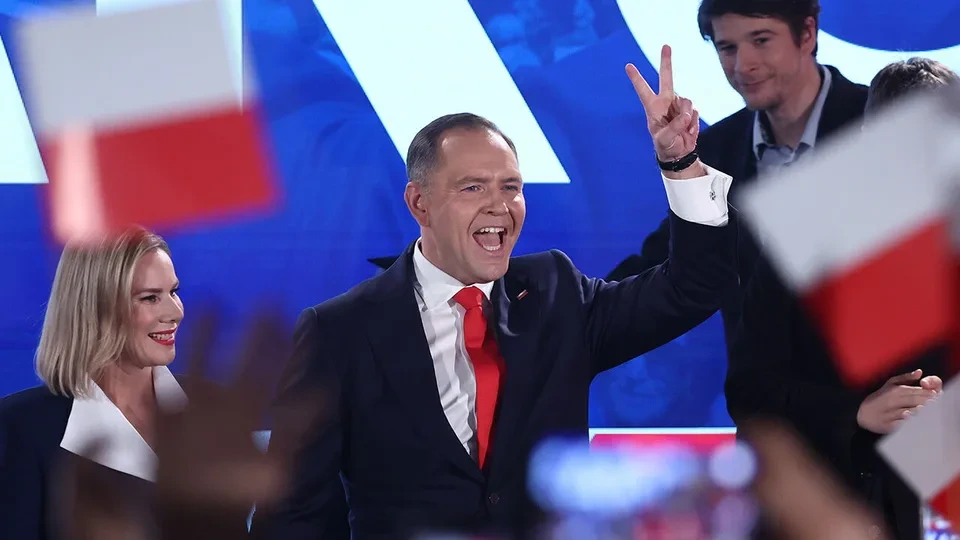Poland has elected a new president — and with this choice, it has challenged not only the government of Donald Tusk, but also the entire liberal Europe. Karol Nawrocki, the candidate from the right-wing opposition, a nationalist and historian supported by President Donald Trump’s allies and populist forces across the globe, has secured a narrow yet symbolically significant victory.
As The Economist noted, the June 1st election was “a distillation of the political choice facing all of Europe.” On one side stood Rafal Trzaskowski, the pro-European liberal and mayor of Warsaw, backed by the centrist government. On the other — Karol Nawrocki, a political newcomer with a background in nationalist activism and historical revisionism, supported by the hard-right Law and Justice (PiS) party. The result: 50.9% of the vote for Nawrocki versus 49.1% for Trzaskowski, with a margin of roughly 300,000 votes.
A Blow to Tusk’s Government
Nawrocki made his intentions clear: his presidency would serve as a check on Prime Minister Donald Tusk. “We will not allow Tusk to consolidate power,” he declared at a post-election rally. The irony of this statement wasn’t lost on many: between 2015 and 2023, PiS had systematically taken over courts, state-owned companies, and public media — all the while consolidating power themselves.
With Nawrocki in the presidency, Tusk’s efforts to restore the rule of law are in jeopardy. Poland’s president has veto power, and the ruling coalition lacks the two-thirds parliamentary majority required to override it. This threatens not only judicial reform, but the entire reformist agenda. The government coalition, which includes everyone from progressive liberals to conservative agrarians, is fragile — and PiS will likely seek to split it by luring away right-leaning MPs.
Political and Economic Risks
Markets responded swiftly and negatively. Poland’s stock market — one of the world’s top performers this year — dropped by 2% following the results. Investors are worried about growing instability and renewed institutional paralysis, as well as the reemergence of Eurosceptic rhetoric.
Public opinion has turned sharply against the government. In an exit poll by Polish firm OGB, 47% of voters said they held a negative view of the government, while only 30% viewed it positively. Much of this is not due to Tusk himself, but to the systemic blockade he faced: outgoing PiS-aligned President Andrzej Duda vetoed numerous appointments and laws. Meanwhile, internal disagreements within the coalition prevented progress on sensitive issues like abortion reform, which PiS had effectively outlawed.
Euroscepticism and Turning Away from Ukraine
While the Polish president doesn’t set foreign policy in the EU, The Economist points out that Nawrocki could still steer the country in a Eurosceptic direction. His campaign received the endorsement of Hungary’s Prime Minister Viktor Orbán and other figures in the European populist bloc. “We don’t want to be a European Union province,” he told supporters.
Of particular concern is Nawrocki’s hard stance on Ukraine. During his campaign, he pledged to oppose Ukraine’s membership in NATO — a highly symbolic move that marks a departure from PiS’s traditionally strong pro-Kyiv stance. Although Polish foreign policy remains in Tusk’s hands, Nawrocki’s rhetoric may weaken Poland’s credibility as a reliable partner in regional security.
Controversial Past and Presidential Image
What worries many observers is not just Nawrocki’s political orientation, but his personal background. In the final weeks of the campaign, Polish media published a series of damaging investigations. Among the allegations: that Nawrocki helped procure sex workers at a hotel in the early 2000s (which he denies), took part in football hooligan brawls in his youth (which he admits), and allegedly scammed an elderly neighbor out of her apartment. Nawrocki’s team has dismissed the stories as smear campaigns orchestrated by Trzaskowski and state-aligned media.
Radosław Markowski, a political scientist at the University of Social Sciences and Humanities in Warsaw, expressed concern to The Economist: “It’s worrying that a man with no political qualifications, who muddles basic issues and has a muddy past, could become president.”
Some Polish voters fear not only domestic setbacks but also geopolitical isolation. “Poland has always been at the center of European wars,” said Marcin, a voter in Warsaw. “No one will defend us if we cut ourselves off from the rest of the continent.”
What Comes Next for Poland
While Nawrocki’s critics see him as a danger to democratic reform, his supporters are celebrating what they see as a victory over the global liberal elite. Slawomir Mentzen, leader of the far-right Konfederacja party, congratulated Nawrocki and expressed hope that he would “not repeat the mistakes of his predecessors.” In a post on X (formerly Twitter), Mentzen listed the new president’s expected priorities: blocking new taxes, defending freedom of speech, and “not putting Ukraine’s interests on par with ours.”
For now, these expectations are largely defined by negation. Nawrocki’s electorate wants him to obstruct — to block reforms, integration, and change.
Poland’s choice sends a clear message to Europe. The election of a far-right president with inflammatory rhetoric, no political experience, and a tainted past could mark the beginning of a prolonged period of domestic conflict, international isolation, and institutional paralysis. According to The Economist, Poland now stands at a crossroads: will it remain part of the European project, or become a nationalist stronghold turning its back on integration and solidarity?
This article was prepared based on materials published by The Economist. The author does not claim authorship of the original text but presents their interpretation of the content for informational purposes.
The original article can be found at the following link: The Economist.
All rights to the original text belong to The Economist.


















